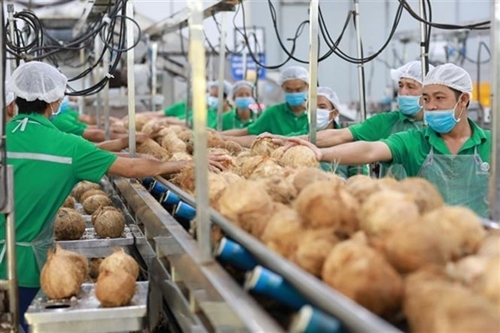Overall, exports of fresh coconuts and coconut products totaled nearly 1.1 billion USD, reflecting a growth of over 20% from 2023.
    |
 |
|
Production of canned coconut water at the Ben Tre Import-Export Joint Stock Company (Betrimex) in the Mekong Delta province of Ben Tre |
This is the first time in 14 years that coconuts have generated a billion-dollar export revenue for Vietnam.
Data from the Ministry of Agriculture and Rural Development indicates that Vietnam currently has 200,000 hectares of coconut plantations, producing about two million tons of the fruits every year.
One-third of this area meets organic standards from the U.S. and Europe, concentrated mainly around the central region and plantations in the Mekong Delta.
The Ben Tre Siamese coconut has been granted geographical indication, with 133 designated plantation codes and over 8,300 hectares dedicated to export production.
With more than 600 businesses involved in coconut production and processing, Vietnam’s coconut industry enjoys a competitive advantage in the international market. Vietnam ranks fourth in terms of coconut exports in the Asia-Pacific region and fifth globally.
China is the largest export market, accounting for 25% of Vietnam’s total coconut exports in terms of value. The signing of a protocol allowing official coconut exports between the two countries in August 2024 has created significant opportunities for the coconut farmers and producers.
Vietnam is currently the third-largest coconut supplier to China, holding over 20% of the market share.
Beyond China, thanks to its competitive pricing and a naturally sweet flavor, Vietnamese coconuts are also highly favored in markets including the E.U., the U.S., Canada and the Republic of Korea.
Despite generating billions of dollars in export revenue, the current figures still do not fully reflect the potential and advantages of Vietnam’s coconut industry, according to representatives.
General Secretary of the Vietnam Coconut Association Cao Ba Dang Khoa said that many fresh coconut export orders have faced delays due to a shortage of plantation codes, packing codes and unstable raw material sources, over the third and fourth quarters of 2024.
Therefore, the Coconut Association has asked authorities to engage with Chinese counterparts aiming to make issuing additional plantation codes for Vietnam easier.
Source: VNA